Terriers are a fascinating and diverse group of dogs, renowned for their spirited personalities, unwavering loyalty, and often distinct appearances. Originally bred for hunting vermin, these tenacious canines come in various shapes and sizes, each with unique traits that make them cherished companions. From agile hunters to loving family pets, understanding the characteristics of different terrier breeds can help you find the perfect furry friend for your home. This comprehensive guide explores a list of popular terrier dog breeds, offering insights into their temperament, needs, and what makes them stand out, including details for those searching for specific [biewer terriers for sale near me](https://dogcarestory.com/biewer-terriers-for-sale-near-me/) or other terrier types.
Unveiling Popular Terrier Dog Breeds
The terrier group is vast, encompassing a wide array of dogs, each with its own charm and history. While they all share a common ancestry rooted in hunting and earth-dog work, their modern roles range from competitive athletes to affectionate lap dogs. Here’s a detailed look at some of the most recognized and beloved terrier breeds you might encounter.
1. Airedale Terrier
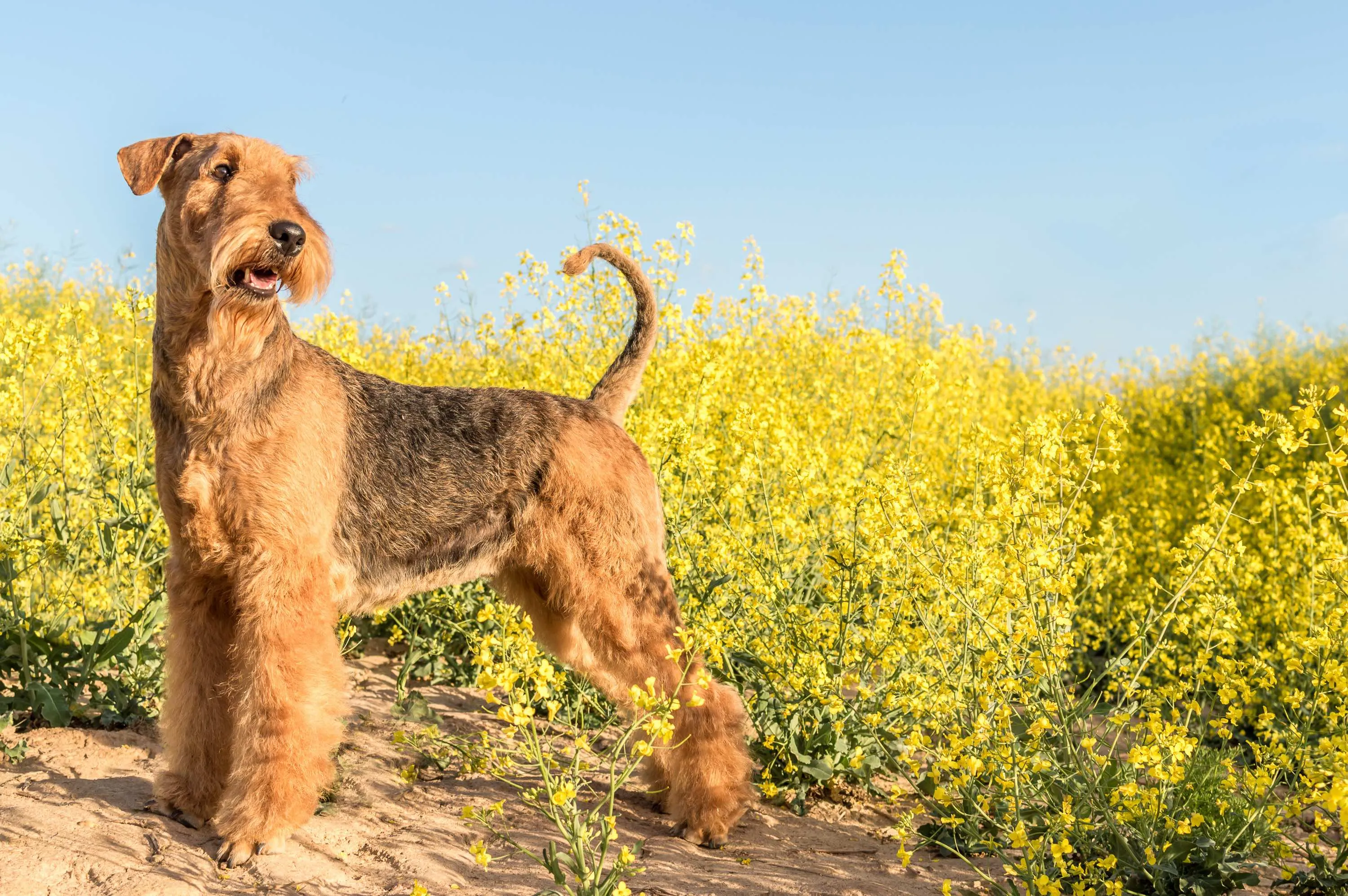 Airedale Terrier standing proudly amidst yellow flowers, showcasing its regal and athletic buildThe Airedale Terrier stands as the largest among all terrier breeds, often referred to as the “King of Terriers.” These intelligent and confident dogs thrive on an active lifestyle, making them ideal companions for individuals or families who enjoy outdoor adventures such as running, hiking, and exploring. Their keen intellect and boundless energy require consistent training and mental stimulation to prevent boredom. Additionally, Airedales are known for their wiry coats that shed minimally, which can be a significant advantage for pet parents with allergies, although regular grooming is still necessary to maintain their distinctive appearance and coat health.
Airedale Terrier standing proudly amidst yellow flowers, showcasing its regal and athletic buildThe Airedale Terrier stands as the largest among all terrier breeds, often referred to as the “King of Terriers.” These intelligent and confident dogs thrive on an active lifestyle, making them ideal companions for individuals or families who enjoy outdoor adventures such as running, hiking, and exploring. Their keen intellect and boundless energy require consistent training and mental stimulation to prevent boredom. Additionally, Airedales are known for their wiry coats that shed minimally, which can be a significant advantage for pet parents with allergies, although regular grooming is still necessary to maintain their distinctive appearance and coat health.
2. American Hairless Terrier
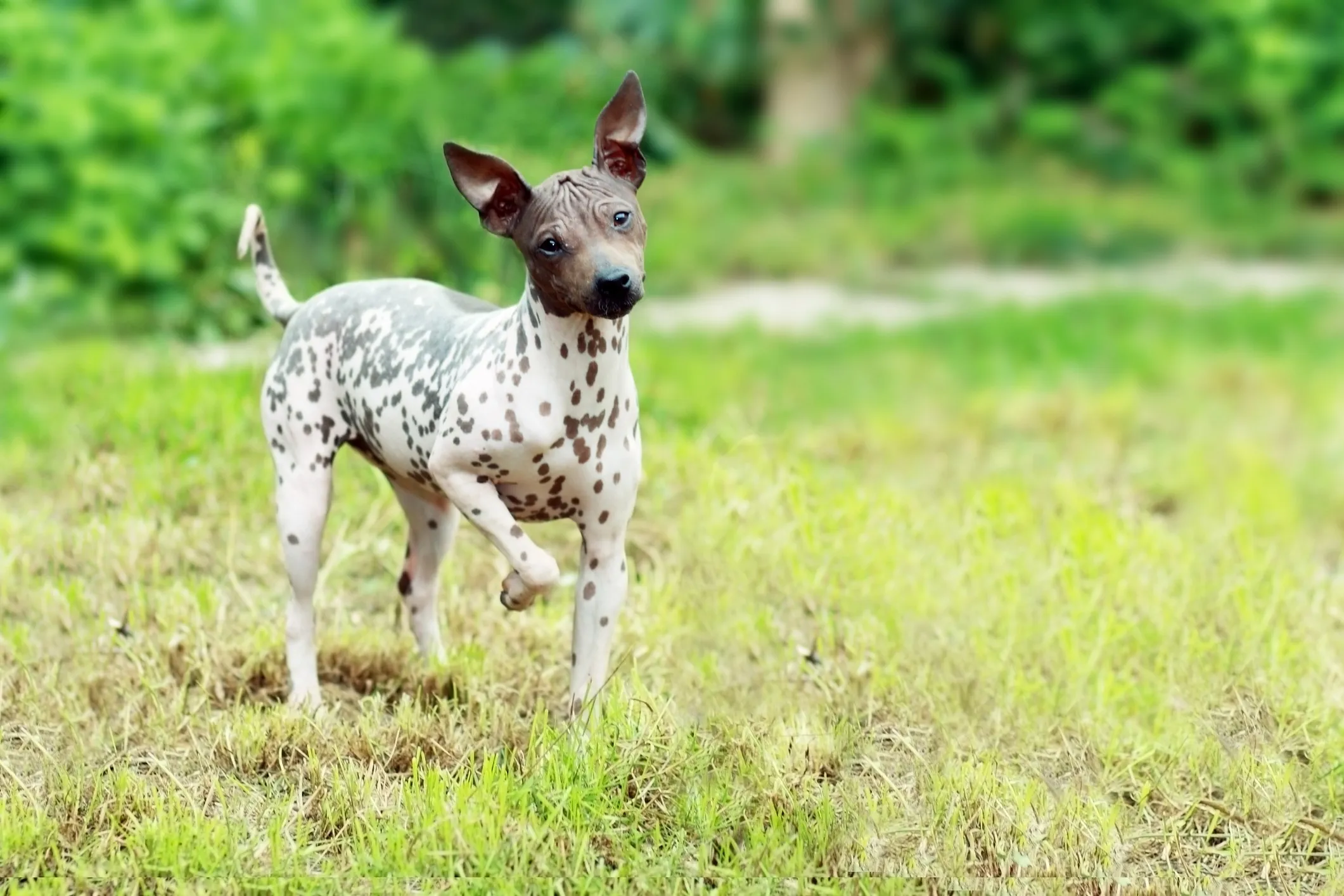 Speckled American Hairless Terrier standing attentively in the lush green grass on a sunny dayWhile the terms “soft and cuddly” might not be the immediate descriptors for all dogs, the American Hairless Terrier offers a unique charm with its playful spirit and deep affection for its family. This breed is truly distinct, being completely devoid of hair, unlike some other hairless breeds that may possess sparse tufts. Their smooth, warm skin necessitates diligent care, including regular cleaning and protection from harsh sun exposure to prevent sunburn and skin irritation. Despite their lack of fur, they are robust, energetic, and thrive on engagement and companionship, forming strong bonds with their human companions.
Speckled American Hairless Terrier standing attentively in the lush green grass on a sunny dayWhile the terms “soft and cuddly” might not be the immediate descriptors for all dogs, the American Hairless Terrier offers a unique charm with its playful spirit and deep affection for its family. This breed is truly distinct, being completely devoid of hair, unlike some other hairless breeds that may possess sparse tufts. Their smooth, warm skin necessitates diligent care, including regular cleaning and protection from harsh sun exposure to prevent sunburn and skin irritation. Despite their lack of fur, they are robust, energetic, and thrive on engagement and companionship, forming strong bonds with their human companions.
3. American Staffordshire Terrier
The American Staffordshire Terrier, affectionately known as the AmStaff, is a breed celebrated for its unwavering loyalty and profound affection for its human companions. These dogs typically adore their families and are known for their courageous yet gentle nature when properly socialized. Early socialization from a young age is paramount, ensuring they grow into well-adjusted adults comfortable around strangers, children, and other pets. Coupled with consistent positive reinforcement training, AmStaffs can integrate seamlessly into family life, making them excellent, devoted companions. For those considering [american pit bull terrier puppy pictures](https://dogcarestory.com/american-pit-bull-terrier-puppy-pictures/) this breed, understanding their need for training and affection is key.
4. Bedlington Terrier
With an undeniably unique appearance, characterized by their lamb-like heads and long, slender legs, the Bedlington Terrier is truly a sight to behold. These graceful dogs are not just about looks; their finely tuned athletic build makes them one of the fastest and most agile members of the terrier family. Their impressive speed and dexterity were historically utilized in hunting smaller game like rabbits and foxes, and today, these attributes allow them to excel in various competitive dog sports, including agility, rally, and even dock diving. Bedlington Terriers are intelligent and sensitive, thriving on companionship and consistent, gentle training.
5. Border Terrier
The Border Terrier is a compact and hardy breed, typically weighing around 15 pounds, embodying a “big dog in a small package” mentality. Despite their diminutive size, they possess a surprisingly loud and resonant bark, which they are quick to deploy whenever something they perceive as suspicious or unusual catches their attention. While they are not known for excessive barking, early positive reinforcement training can effectively manage and redirect this behavior, ensuring they learn appropriate responses to new stimuli. This training also serves to keep these intelligent pups mentally stimulated and actively engaged, contributing to their overall well-being and happiness. Finding [border terrier puppies for sale near me](https://dogcarestory.com/border-terrier-puppies-for-sale-near-me/) can be exciting for those seeking a small but spirited companion.
6. Bull Terrier
Perhaps most recognizable as the iconic Target mascot, the Bull Terrier is much more than just a brand symbol; it makes for a remarkably loving and devoted family dog. These charming canines are known for their distinctive egg-shaped heads and robust, muscular builds. Due to specific genetic factors linked to their extreme white piebald genes, Bull Terriers unfortunately have a higher incidence of congenital deafness compared to many other terrier breeds. This means that prospective pet parents may need to adapt their training methods, placing a greater emphasis on visual cues and hand signals rather than relying solely on auditory commands to effectively communicate with their deaf or partially deaf companions.
7. Cairn Terrier
Small in stature but immense in spirit, the Cairn Terrier was originally bred as a tenacious working dog. Hailing from the rugged landscapes of the Isle of Skye and the Scottish Highlands, these agile terriers were highly valued by farmers for their exceptional skills as vermin hunters. Today, Cairn Terriers continue to thrive in environments that offer plenty of outdoor space, especially homes with securely fenced yards. Their inherent high prey drive makes them prone to chasing small animals, a testament to their ancestral hunting instincts. Providing them with opportunities for safe, supervised outdoor exploration and engaging playtime is crucial for their physical and mental health.
8. Irish Terrier
If you’re seeking an energetic and spirited adventure buddy, the Irish Terrier might be your ideal canine match. With their athletic build, characterized by long legs and a lean body, these dogs are perfectly suited for a variety of vigorous activities such as running, hunting, and exploring new environments, including local dog parks and trails. Their boundless curiosity is a hallmark of the breed, so it’s essential to always keep them securely on a leash when out and about to prevent them from embarking on unscheduled explorations or chasing after interesting scents. Consistent exercise and mental engagement are key to a happy and well-adjusted Irish Terrier.
9. Kerry Blue Terrier
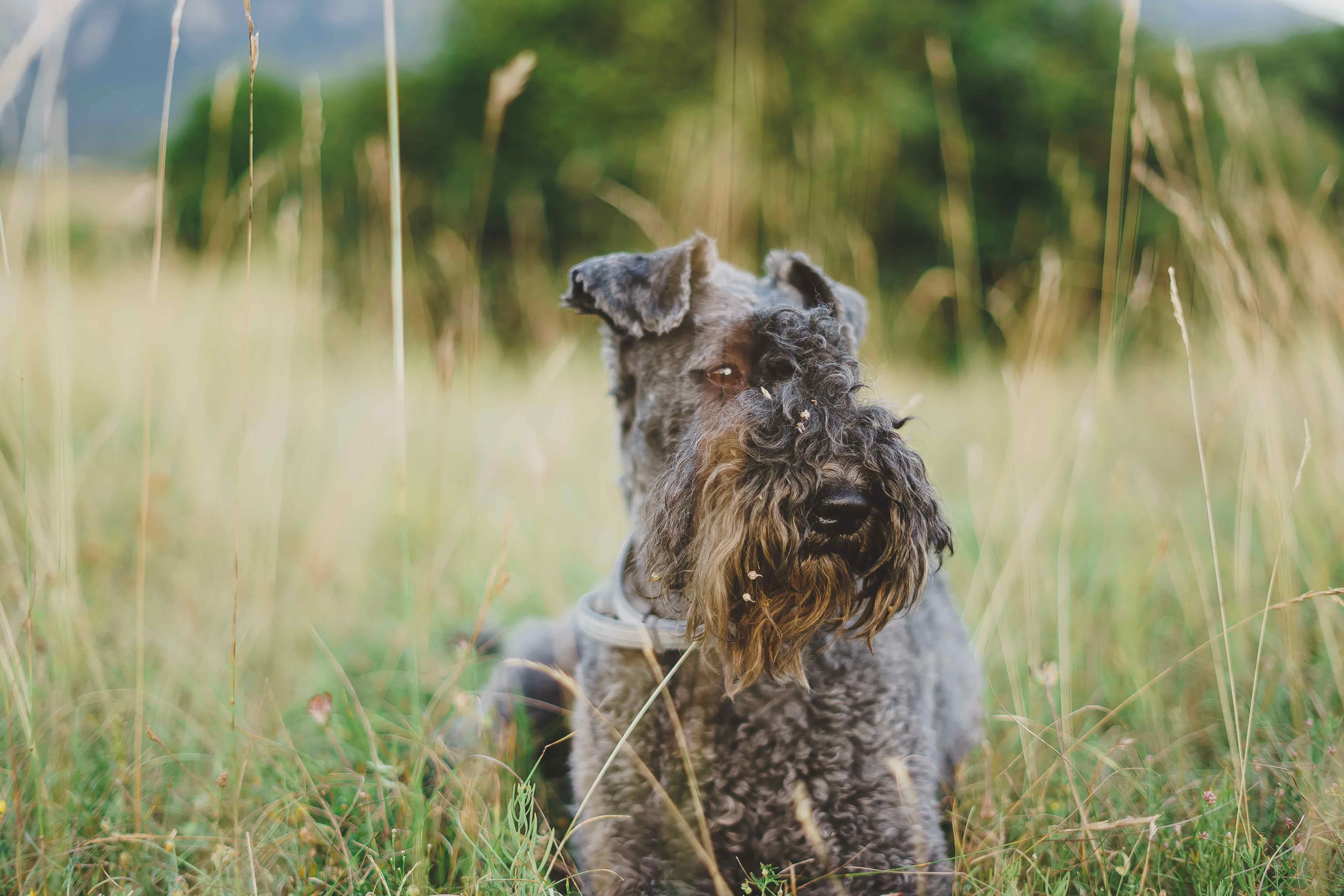 Close-up of a distinguished Kerry Blue Terrier with a prominent beard, resting peacefully in a lush fieldThe Kerry Blue Terrier traces its lineage back to Ireland, where these versatile dogs once served as indispensable farmhands, adept at various tasks. In contemporary settings, Kerry Blues remain highly active dogs who relish engaging in long walks, invigorating swimming sessions, and enthusiastic games of fetch with their beloved families. Among their many unique attributes is their striking soft, wavy, blue-gray coat, which is truly distinctive. Pet parents typically opt for a grooming style that keeps the body hair relatively short while maintaining a longer, characteristic beard on the face, giving the Kerry Blue its signature elegant and rugged appearance.
Close-up of a distinguished Kerry Blue Terrier with a prominent beard, resting peacefully in a lush fieldThe Kerry Blue Terrier traces its lineage back to Ireland, where these versatile dogs once served as indispensable farmhands, adept at various tasks. In contemporary settings, Kerry Blues remain highly active dogs who relish engaging in long walks, invigorating swimming sessions, and enthusiastic games of fetch with their beloved families. Among their many unique attributes is their striking soft, wavy, blue-gray coat, which is truly distinctive. Pet parents typically opt for a grooming style that keeps the body hair relatively short while maintaining a longer, characteristic beard on the face, giving the Kerry Blue its signature elegant and rugged appearance.
10. Miniature Bull Terrier
It’s important not to confuse the Miniature Bull Terrier with its larger counterpart, the standard Bull Terrier, despite their similar appearances and shared ancestry. These are recognized as two distinct breeds by organizations like the American Kennel Club (AKC). Miniature Bull Terriers are known for their lively and spirited personalities, but they also tend to get bored quite easily. To keep them happy and well-behaved, they require a regular regimen of playtime, consistent training, and a variety of enriching toys that challenge their minds and keep them entertained. Providing ample mental and physical stimulation is crucial for this breed to prevent destructive behaviors born out of boredom.
11. Miniature Schnauzer
Miniature Schnauzers have a rich history that dates back as far as the 1400s, originally serving as versatile farm dogs. Today, they are cherished as beloved family pets, highly adaptable to a wide range of living environments, whether it’s a cozy apartment in the city or a sprawling home with a large backyard. Regardless of their living situation, Miniature Schnauzers possess a lively and energetic disposition, demanding plenty of daily exercise and consistent attention from their families. Their distinctive bearded and bushy-browed appearance, coupled with their intelligent and playful nature, makes them a delightful addition to many households.
12. Norfolk Terrier
Norfolk Terriers were initially bred for the purposeful task of hunting vermin in agricultural fields, a role they performed with great tenacity. However, in modern times, these tiny yet robust pups are far better suited to a comfortable indoor existence alongside attentive and playful human companions. Like many breeds within the terrier group, the Norfolk Terrier boasts a wiry, hard coat that, conveniently, does not shed excessively. This characteristic makes them a relatively low-maintenance option for pet parents who may be prone to allergies, allowing for a harmonious coexistence. They are affectionate and courageous, bringing much joy to their families.
13. Norwich Terrier
The Norwich Terrier shares many similarities in appearance and temperament with its close relative, the Norfolk Terrier. However, discerning eyes will note subtle differences, such as the Norwich Terrier typically having a slightly longer coat and distinctly upright ears, as opposed to the folded ears of the Norfolk. These spirited pups are known for their tendency to bark frequently, a trait that can be managed effectively with early intervention. Initiating positive reinforcement training classes from a young age is highly recommended to help redirect any undesirable barking behaviors, ensuring they learn when and when not to vocalize.
14. Parson Russell Terrier
The Parson Russell Terrier, often colloquially known as the Jack Russell Terrier, bears the name of Reverend John Russell, a parson who was instrumental in developing the breed for fox hunting in the 19th century. These high-energy dogs are famously agile and intelligent pets, but they have also achieved widespread fame through popular culture. Many will fondly remember Wishbone from the beloved PBS television series, while fans of actor Jim Carrey might recall Milo the Jack Russell from the iconic 1994 film “The Mask.” Their spirited nature and compact size make them excellent companions for active families, and you might even find [pictures of jack russell terrier and chihuahua mix](https://dogcarestory.com/pictures-of-jack-russell-terrier-and-chihuahua-mix/) if you’re exploring diverse terrier looks.
15. Rat Terrier
Rat Terriers are exceptionally well-rounded dogs, demonstrating versatility in many roles; they are as capable as proficient hunters and agile canine athletes as they are cherished, loving lap dogs. These intelligent and adaptable companions generally get along splendidly with children and other household pets, provided they are introduced to them at a young and impressionable age. They genuinely thrive when they are at the center of attention, surrounded by their beloved human family members, eagerly participating in activities and receiving affection. Their eagerness to please and zest for life make them truly engaging companions.
16. Russell Terrier
Russell Terriers bear a striking resemblance to Parson Russell Terriers, and for a period, they were even considered the same breed before the Russell Terrier diverged to establish its own distinct lineage. While the two breeds appear nearly identical at first glance, the Russell Terrier is typically characterized by a slightly smaller stature. Much like their Parson Russell cousins, these high-energy dogs possess an insatiable need for vigorous exercise and continuous mental stimulation to keep them content and well-behaved. They excel in active homes where their zest for life can be fully embraced and channeled.
17. Scottish Terrier
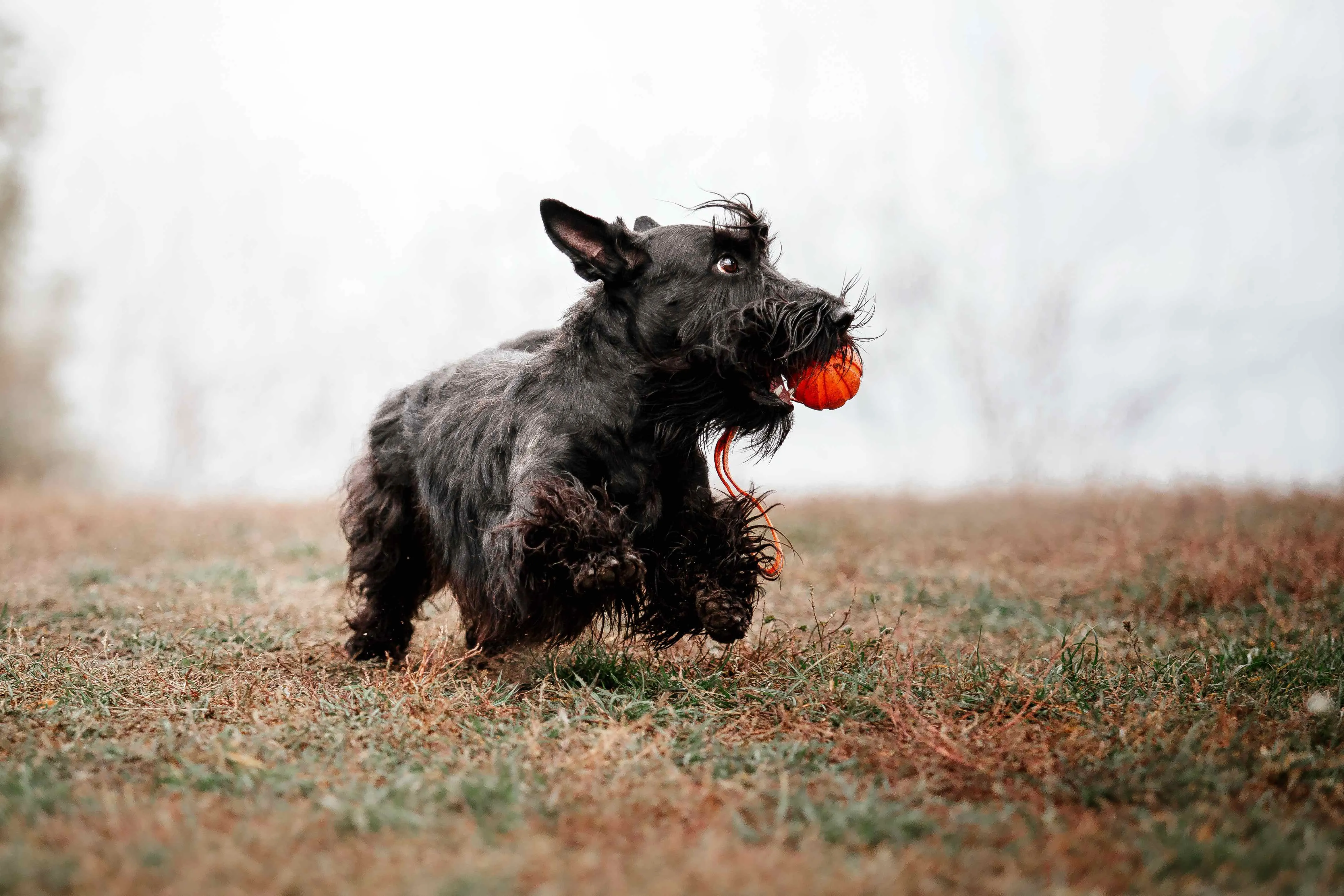 Black Scottish Terrier joyfully running through a vibrant green field with a bright red ball firmly clutched in its mouthScottish Terriers, affectionately known as Scotties, originated as tenacious vermin hunters in 19th-century Scotland. This endearing breed is instantly recognizable by its sturdy build, distinctive bearded muzzle, and characteristically thick, wiry outer coat paired with a dense undercoat. To maintain their unique appearance and prevent matting, Scotties require brushing at least twice a week. While they form deep bonds and love their humans fiercely, they may not naturally be the best friends with other household pets without careful and proper introductions, highlighting the importance of early socialization for harmonious multi-pet homes. Additionally, for those curious about `[terrier dog breeds black and white](https://dogcarestory.com/terrier-dog-breeds-black-and-white/)`, the Scottish Terrier is a prime example of a striking black terrier.
Black Scottish Terrier joyfully running through a vibrant green field with a bright red ball firmly clutched in its mouthScottish Terriers, affectionately known as Scotties, originated as tenacious vermin hunters in 19th-century Scotland. This endearing breed is instantly recognizable by its sturdy build, distinctive bearded muzzle, and characteristically thick, wiry outer coat paired with a dense undercoat. To maintain their unique appearance and prevent matting, Scotties require brushing at least twice a week. While they form deep bonds and love their humans fiercely, they may not naturally be the best friends with other household pets without careful and proper introductions, highlighting the importance of early socialization for harmonious multi-pet homes. Additionally, for those curious about `[terrier dog breeds black and white](https://dogcarestory.com/terrier-dog-breeds-black-and-white/)`, the Scottish Terrier is a prime example of a striking black terrier.
18. Smooth Fox Terrier
Smooth Fox Terriers and Wire Fox Terriers are closely related breeds that share many similarities, but they are primarily distinguished by a single defining characteristic: the texture of their coats. As their name suggests, the Smooth Fox Terrier boasts a sleek, short, and typically smooth coat, which is most often predominantly white with markings in blue, black, or red. This smooth coat requires weekly brushing to keep it in prime condition, and it’s worth noting that they tend to shed more noticeably than their wiry-haired counterparts. Despite this, they are energetic, intelligent, and spirited companions, always ready for an adventure.
19. Soft Coated Wheaten Terrier
This charming terrier breed earns its name from its signature soft, wavy, and distinctively wheat-colored coat, which is truly a defining feature. Soft Coated Wheaten Terriers were initially bred as versatile farm dogs in Ireland, where their intelligence and agility made them invaluable. Today, these affectionate dogs continue to thrive when they have ample space to roam and play, making a securely fenced yard an ideal environment for them. Wheatens are known for their joyful “Wheaten Greetin'” where they jump up to welcome their loved ones, embodying their outgoing and friendly nature.
20. Staffordshire Bull Terrier
Staffordshire Bull Terriers are often lovingly referred to as “nanny dogs” due to their remarkable reputation for being gentle, patient, and exceptionally loving with children. This terrier breed, unfortunately, is sometimes misunderstood because of its muscular appearance. It is crucial to remember that breed specific traits influence only a small percentage of a dog’s overall behavior, and each dog is very much an individual. Consistent socialization from puppyhood, coupled with positive reinforcement training, is vitally important for every dog, including Staffies, to ensure they develop into well-adjusted, confident, and beloved family members who feel safe and cherished.
21. West Highland White Terrier
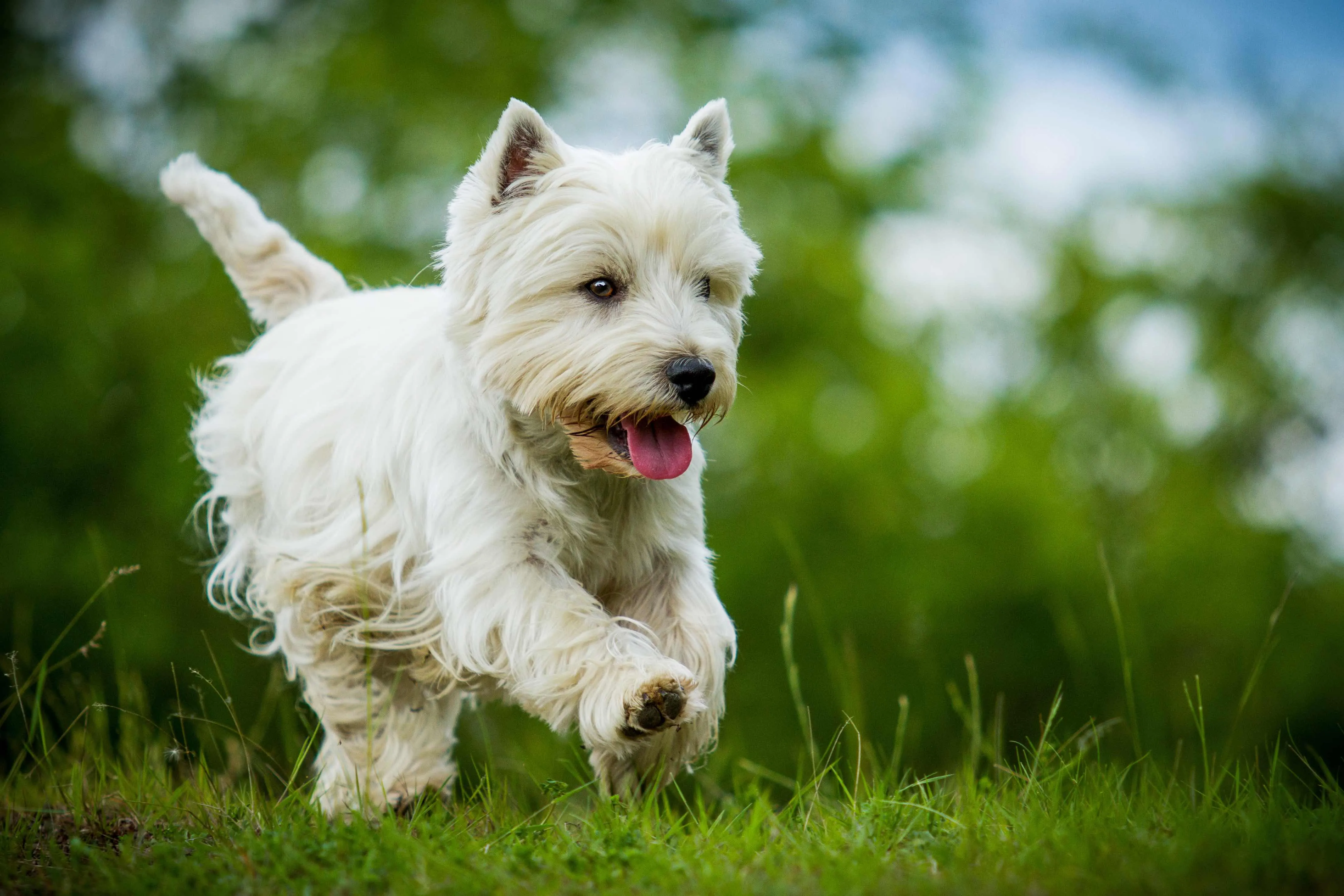 Energetic West Highland White Terrier (Westie) playfully running through the vibrant green grass outdoorsThe West Highland White Terrier, affectionately known as the Westie, is another cherished Scottish terrier breed. Originally developed to hunt rodents and other small pests in the rugged Scottish landscape, today’s Westies are far better suited to life as indoor companions. They are characterized by their bright white double coat, dark, intelligent eyes, and a confident, affectionate personality. These high-energy dogs require pet parents who are committed to providing plenty of playtime and engaging activities, ensuring their spirited nature is well-channeled. Their loyalty and playful antics make them wonderful additions to active families.
Energetic West Highland White Terrier (Westie) playfully running through the vibrant green grass outdoorsThe West Highland White Terrier, affectionately known as the Westie, is another cherished Scottish terrier breed. Originally developed to hunt rodents and other small pests in the rugged Scottish landscape, today’s Westies are far better suited to life as indoor companions. They are characterized by their bright white double coat, dark, intelligent eyes, and a confident, affectionate personality. These high-energy dogs require pet parents who are committed to providing plenty of playtime and engaging activities, ensuring their spirited nature is well-channeled. Their loyalty and playful antics make them wonderful additions to active families.
22. Wire Fox Terrier
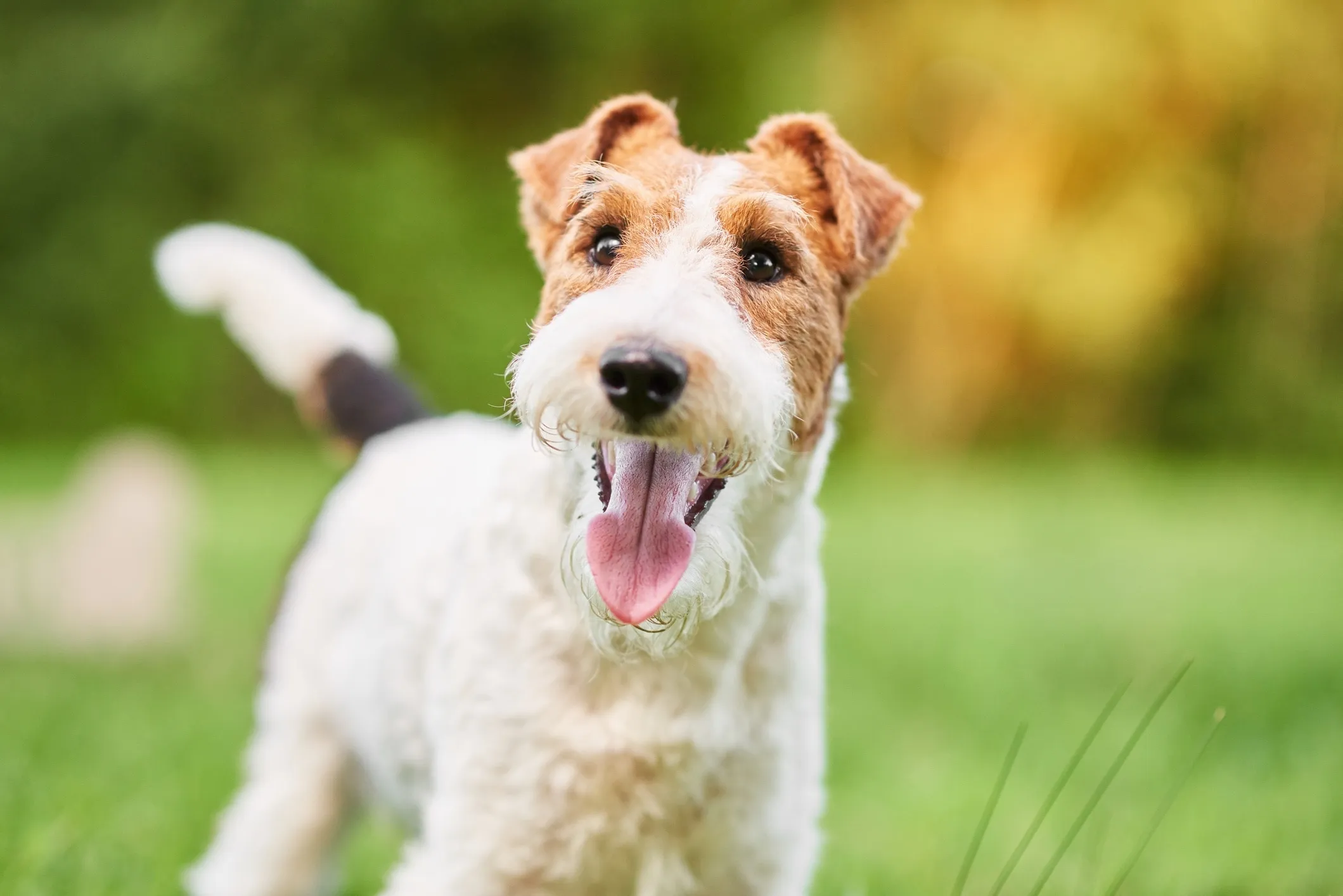 Cheerful Wire Fox Terrier with a distinctive wiry coat smiling brightly, full of life and characterWire Fox Terriers are instantly recognizable by their dense, wiry overcoat, which requires regular professional grooming or hand-stripping to maintain its texture and shape. This unique coat, however, offers a practical advantage: it helps these active pups stay relatively clean and dry compared to longer-haired breeds, especially when they are out exploring the great outdoors. Despite its self-cleaning properties, if a Wire Fox Terrier decides to take a dip in a muddy pond or roll in dirt, a good bath will almost certainly be necessary afterwards. They are intelligent, bold, and endlessly entertaining companions.
Cheerful Wire Fox Terrier with a distinctive wiry coat smiling brightly, full of life and characterWire Fox Terriers are instantly recognizable by their dense, wiry overcoat, which requires regular professional grooming or hand-stripping to maintain its texture and shape. This unique coat, however, offers a practical advantage: it helps these active pups stay relatively clean and dry compared to longer-haired breeds, especially when they are out exploring the great outdoors. Despite its self-cleaning properties, if a Wire Fox Terrier decides to take a dip in a muddy pond or roll in dirt, a good bath will almost certainly be necessary afterwards. They are intelligent, bold, and endlessly entertaining companions.
Choosing Your Perfect Terrier Companion
The world of terrier dog breeds is incredibly rich and varied, offering a wide spectrum of personalities, sizes, and care requirements. From the robust Airedale to the spirited Westie, each breed brings its own unique set of characteristics to the table. When considering bringing a terrier into your home, it’s essential to research specific breeds thoroughly, taking into account their energy levels, grooming needs, training requirements, and how well they fit into your lifestyle. Providing a terrier with consistent training, early socialization, and plenty of mental and physical stimulation is key to fostering a happy, well-adjusted companion. Ultimately, the right terrier will become a loyal and affectionate member of your family, enriching your life with their boundless energy and unwavering devotion. Read more about finding the ideal dog for your family on our website.
